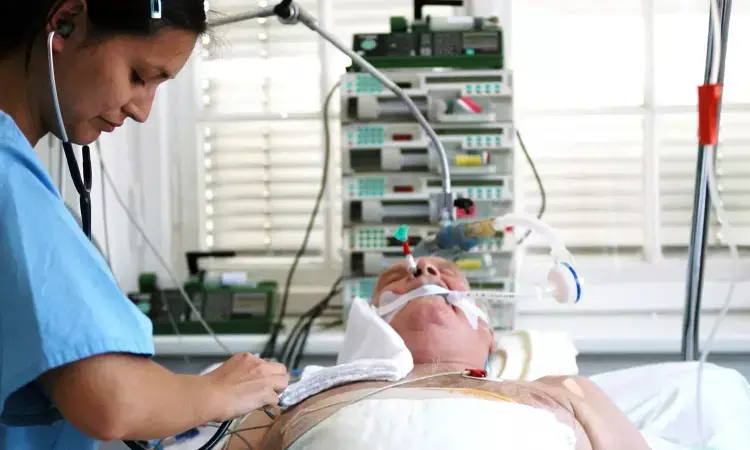- Home
- Medical news & Guidelines
- Anesthesiology
- Cardiology and CTVS
- Critical Care
- Dentistry
- Dermatology
- Diabetes and Endocrinology
- ENT
- Gastroenterology
- Medicine
- Nephrology
- Neurology
- Obstretics-Gynaecology
- Oncology
- Ophthalmology
- Orthopaedics
- Pediatrics-Neonatology
- Psychiatry
- Pulmonology
- Radiology
- Surgery
- Urology
- Laboratory Medicine
- Diet
- Nursing
- Paramedical
- Physiotherapy
- Health news
- Fact Check
- Bone Health Fact Check
- Brain Health Fact Check
- Cancer Related Fact Check
- Child Care Fact Check
- Dental and oral health fact check
- Diabetes and metabolic health fact check
- Diet and Nutrition Fact Check
- Eye and ENT Care Fact Check
- Fitness fact check
- Gut health fact check
- Heart health fact check
- Kidney health fact check
- Medical education fact check
- Men's health fact check
- Respiratory fact check
- Skin and hair care fact check
- Vaccine and Immunization fact check
- Women's health fact check
- AYUSH
- State News
- Andaman and Nicobar Islands
- Andhra Pradesh
- Arunachal Pradesh
- Assam
- Bihar
- Chandigarh
- Chattisgarh
- Dadra and Nagar Haveli
- Daman and Diu
- Delhi
- Goa
- Gujarat
- Haryana
- Himachal Pradesh
- Jammu & Kashmir
- Jharkhand
- Karnataka
- Kerala
- Ladakh
- Lakshadweep
- Madhya Pradesh
- Maharashtra
- Manipur
- Meghalaya
- Mizoram
- Nagaland
- Odisha
- Puducherry
- Punjab
- Rajasthan
- Sikkim
- Tamil Nadu
- Telangana
- Tripura
- Uttar Pradesh
- Uttrakhand
- West Bengal
- Medical Education
- Industry
Ghrelin shows promise for neuroprotection in post-cardiac arrest coma: reveals Groundbreaking trial

Netherlands: In a groundbreaking development in critical care medicine, a recent randomized clinical trial has shed light on the potential neuroprotective effects of Ghrelin in patients experiencing post-cardiac arrest coma. The findings, published in the prestigious journal JAMA Neurology, offer new hope for improving outcomes in this vulnerable patient population.
Acyl-ghrelin demonstrated potential efficacy and safety in enhancing neurological outcomes. There is a need for Phase 3 trials for conclusive evidence.
"In phase 2, a placebo-controlled, multicenter, randomized clinical trial (RCT) that comprised 160 patients in a coma within 12 hours of cardiac arrest, treatment with IV (intravenous) acyl-ghrelin for one week was safe," the researchers reported.
"Neurological outcome by the categories of cerebral performance was nonsignificantly better, and neuron-specific enolase levels were significantly lower in the intervention group."
Post-cardiac arrest coma, a devastating consequence of cardiac arrest, is characterized by profound neurological dysfunction and impaired consciousness, often resulting from global cerebral ischemia-reperfusion injury. Despite advancements in resuscitation techniques, neurological recovery remains a significant challenge, prompting researchers to explore novel therapeutic strategies aimed at mitigating brain injury and enhancing neuronal survival.
Despite research on more than 20 neuroprotective strategies involving patients in comas after cardiac arrest, none have shown unequivocal evidence of efficacy; however, acyl-ghrelin treatment has demonstrated improved functional and histological brain recovery in experimental models of cardiac arrest and was safe in a wide variety of human study populations.
Against the above background, Sjoukje Nutma, University of Twente, Enschede, the Netherlands, and colleagues aimed to determine the safety and efficacy of IV acyl-ghrelin to improve neurological outcomes in patients in a coma after cardiac arrest.
For this purpose, the researchers conducted the GRECO trial between 2019 and 2022. The researchers assessed adult patients 18 years or older who were in a comatose state after cardiac arrest for eligibility; patients were from 3 intensive care units (ICUs) in the Netherlands. Expected death within 48 hours or unfeasibility of treatment initiation within 12 hours were exclusion criteria.
Patients were randomized to receive IV acyl-ghrelin, 600 μg (intervention group), or placebo (control group) within 12 hours after cardiac arrest, continued for seven days, twice daily, in addition to standard care.
The study's primary outcome was the Cerebral Performance Categories (CPC) scale score at six months. Safety outcomes included any severe adverse events. Secondary outcomes were neuron-specific enolase (NSE) levels and mortality on days 1 and 3.
Seven hundred eighty-three adult patients in a coma after cardiac arrest were assessed for eligibility, and 160 patients (median age, 68 years; 75% were males) were enrolled. Eighty-one patients were assigned to the intervention group, and 79 were assigned to the control group.
The study revealed the following findings:
- The common odds ratio (OR) for any CPC improvement in the intervention group was 1.78. This was consistent over all CPC categories.
- Mean NSE levels on day one after cardiac arrest were significantly lower in the intervention group (34 μg/L versus 56 μg/L) and on day 3 (28 μg/L versus 52 μg/L).
- Serious adverse events were comparable in incidence and type between the groups.
- Mortality was 37% in the intervention group vs 51% in the control group (absolute risk reduction, 14%).
"In phase 2, placebo-controlled, RCT, IV treatment with acyl-ghrelin for 1 week was safe and potentially effective to improve neurological and brain recovery in patients in a coma after cardiac arrest," the researchers wrote. "There is a need for phase 3 trials for conclusive evidence of efficacy."
Reference:
Nutma S, Beishuizen A, van den Bergh WM, et al. Ghrelin for Neuroprotection in Post–Cardiac Arrest Coma: A Randomized Clinical Trial. JAMA Neurol. Published online May 06, 2024. doi:10.1001/jamaneurol.2024.1088
Dr Kamal Kant Kohli-MBBS, DTCD- a chest specialist with more than 30 years of practice and a flair for writing clinical articles, Dr Kamal Kant Kohli joined Medical Dialogues as a Chief Editor of Medical News. Besides writing articles, as an editor, he proofreads and verifies all the medical content published on Medical Dialogues including those coming from journals, studies,medical conferences,guidelines etc. Email: drkohli@medicaldialogues.in. Contact no. 011-43720751


